- Home
- Elizabeth Strout
Abide With Me Page 6
Abide With Me Read online
Page 6
LATER THAT MORNING, every church pew filled and sunlight pouring through the side windows, the congregation stood and sang all five verses of the opening hymn.
Heaven’s morning breaks, and earth’s vain shadows flee;
In life, in death, O Lord, abide with me.
The organ music stopped, people returned their hymnals to the wooden holders in front of them, arranging themselves with just the smallest tug on a sweater, a smoothing of a skirt or trouser leg as they sat down. In the silence that followed was an expectant, hopeful air. Tyler, stepping to the middle of the chancel, felt within him the irrepressible unfolding of great joy. “God is merciful,” he told the people of West Annett, his voice deep with confidence. “God owes us nothing. We owe Him everything.”
THREE
If there were lingering doubts about Lauren Caskey—and there were—there were very few doubts about her husband, who, while the organ finished the prelude, would take his seat on the chancel, his large, black-robed self appearing at great ease, radiating something strong and open. What the congregation felt, during those first years as they settled into the pews, was that they were entering into the presence of warmth; and warmth up there in West Annett was not something found growing on trees. Understand—the inland reaches of northern New England, with its quick, hot summers, and long, dark winters, had bred for generations a way of life that had at its center the need to endure. A child slipping on an icy driveway, banging his chin against the car door, would most likely be told, “Grit your teeth and bear it,” even when one of the teeth had, as in the case of Toby Dunlop, gone straight through the lower lip, poking out the other side. No trip to the doctor was needed. “You’ll live,” he was told, and he did—bearing a small white scar that he never showed anyone except his first girlfriend. If the men were not especially talkative, their fathers had not been, either. If the women cooked meals that might seem, to someone from other parts, flavorless and straightforward, it is because they cooked what was available to them: chicken, potatoes, canned corn. And if their children were not allowed Novocain when having their cavities drilled, it was not cold-heartedness but a belief that life was a struggle, character honed every step of the way.
And life was a struggle. There was, up in West Annett, thick ice that needed to be chipped away all winter long from doorsteps and windshields, chains to be put on tires so the cars could crawl slowly over snow-packed roads just to get to the grocery store. Often families heated only one or two rooms during the winter months; furnaces broke, wood-burning stoves needed logs brought in from the barn, or up through a cellar door. Most homes were not within easy walking distance of one another, and the isolation was hard on the old folks, mothers with small children—hard on everyone, really. People went to church not so much because they believed they should but because it gave them a chance to get out of the house, dress nicely, pick up a bit of local news. Sitting through the sermon during the long tenure of Reverend Smith had been something you had to grit your teeth and bear, and a lot of the men wouldn’t do it. It was not uncommon during that time for men to stay home on Sunday mornings after dropping off their wife and kids.
But Tyler Caskey had been something altogether different. That he didn’t read his sermons, or even appear to be using notes, allowed his parishioners to watch his open face as he spoke to them; a light seemed to flicker across his features. “Let us adore God,” he said—and you could see that he meant this—“let us adore our mothers and fathers and children. Let us adore the snow-covered trees on the hills, the stone walls built by strong men, the chickadees who brave the winters, and the robins who return in spring. Let us give thanks. Let us adore him, Christ our Lord.”
The idea that he was putting himself at risk by creating strong feelings of attachment in members of his parish—that attendance rose sharply as people came to sit in the presence of his earnest warmth—the idea there was danger in any of this, was something Tyler didn’t recognize. When he went one weekday to visit George Atwood at Brockmorton Theological Seminary, and spoke of the thrill he felt at his new job, his old professor had listened and said only, “Reminds me of the remark Hirohito made to an aide: ‘The fruits of victory are tumbling into our mouths too quickly.’ “ Tyler, driving home, thought perhaps the man held a tiny bitterness within him, because he was old and his enthusiasms gone.
HE REMEMBERED THIS NOW, buttoning his new shirt on Sunday morning. A storm front had moved in overnight, and the clear-skied October days with all their glittering sunlight had given way to a pouring rain. Tyler could see through his study window rain hitting the bricks in the garden with such force it splashed up again, watery bullets exploding.
He slipped his sermon into a folder and walked down the hall to the kitchen.
Margaret Caskey, scrubbing a potato, said she would forgo church this morning, stay with the baby, and get dinner ready, but Katherine Estelle should put on her boots and go to kinderkirk. “You don’t want to ruin those new shoes your Aunt Belle bought you, although you’ve scuffed them up plenty already, I’d say, by the look of things.”
The child knew her grandmother didn’t like her. She wondered, sitting next to her father in the front seat with the windshield wipers going flip-flip, and her feet in the red boots sticking out in front of her, if her father knew this, too. She turned her head and gazed at him.
“What, honey?” he said. “You need to toss your cookies again?” He had picked the child up on Thursday at the nurse’s office—not seeing Mrs. Ingersoll—and the child had seemed fine since. He’d let her stay at home on Friday, coloring silently in his study as he read. Later, they had gone for a drive, not returning until it was dark, the child asleep, her little neck bent to the side.
Now she kicked her red boots once. Her face got warm remembering Martha Watson yelling, “Katie Caskey threw up and it smells!” The children holding their noses.
“Katherine?” Her father put his huge hand over her knee, and gave a little squeeze. It made her laugh, that delicious squiggle of a golden magic wand inside her knee. And when, in a few moments, he took his big, warm hand away, the loss felt as awful as her knee had felt happy.
“There won’t be many people, with the rain today,” her father said to the watery windshield in front of him.
But there were as many people as usual. Alison Chase, in her kinderkirk room, had her hands full. Kids hopped all over, brightly dressed little birds. Mrs. Chase said, “Good morning, Katherine,” her orange lipstick spreading in a smile, but then Mrs. Chase said nothing else to her and so Katherine kept her boots on all morning, her feet inside feeling moist and too warm.
The orange color of Mrs. Chase’s lipstick was so icky that Katherine didn’t like to even look at her, and when Mrs. Chase led the children into the activities room, Katherine dawdled off to the side while everyone sang “What a Friend We Have in Jesus” and Mrs. Chase played the piano. They had to say the Lord’s Prayer with their heads bowed and their eyes closed, but Katherine didn’t close her eyes. She looked at her red rubber boots and, in the middle of the prayer, Katherine said calmly and quietly, “I hate God.”
DOWN THE HALL IN THE SANCTUARY, women shook the raindrops from their clear plastic bonnets and opened their coats, shifting the shoulders a bit, but keeping them on, for women were expected to keep their coats on in church; the men were not. The men, either in the vestibule or in the aisle before entering the pew, slipped off their overcoats and folded them today into damp squares, which they set beside them on the crimson-colored cushions or slipped beneath the pews. When the organ prelude stopped, there was the occasional stomach heard to be growling, a set of keys fell to the floor, and people arranged themselves, looking with expectant faces toward Reverend Caskey as he stepped up to the pulpit. But even now, a full year later, no one dared yet sit in the third-row pew.
The woman had been lovely.
She had been lovely, her bright hair visible above the fur collar of her beige woolen coat, lovely as she stood
beside her husband on the church steps, her cheeks glowing in the winter sunlight. Even if some of this loveliness was the result of carefully applied makeup and expensive, well-fitting clothes. Lauren Caskey, it was said, must have been spending a great deal of time in front of the mirror, because she certainly didn’t seem to be spending a great deal of time anywhere else. It’s true—there was a curious absence from functions at which you might reasonably expect to find a minister’s wife. The Ladies’ Aid, the Sunshine Committee, the Missionary Committee—she wasn’t there. But she did have a baby to attend to, as well as (an eyebrow going up) her hair. Whose color of ripe apples in the sunshine came directly from a bottle, and whose roots would require, it was decided by people who knew, monthly attention and special care.
But if Lauren Caskey was aware of the ambivalence she inspired, you never would have known it to see her seated in the third-row pew every Sunday, beaming pleasantly at those around her. Eventually, the tiny, tow-headed Katherine Estelle would sit there, too, playing with a rag doll and a ratty little blanket. Occasionally the child would cluck her tongue, or sing her baby to sleep, and the churchgoers sitting behind them would see Mrs. Caskey tap the little girl on her shoulder, putting a finger to her lips, and the little girl and her mother would raise their shoulders and squinch their faces in a smile to each other, as though they had some secret between them, and the girl would be quiet again. There was something—you couldn’t put your finger on it exactly, but they had continued to provoke a reaction, this mother and her little girl. The mother wasn’t friendly enough, was part of it. As much as Lauren Caskey would beam and smile and shake hands in the vestibule after the service, she had a certain carelessness about her, as though she had no interest in coming to your house, no real interest in how other people lived, here in their small town.
But then Mrs. Caskey became pregnant again, and her husband ushered her about town with a hand beneath her elbow. She could often be found in the children’s room of the Academy’s library with Katherine. The librarian, Mrs. White, reported how the mother was good to the girl, reading to her on the big window seat, how the girl would press her ear to her mother’s bulbous stomach. One day, however, Mrs. White observed the mother whispering to the child while drawing on a piece of paper, and the child whispered back, loudly, “In the beegina?”
Mrs. White, recalling all this as she shifted her weight against the side of the pew on this rainy October Sunday, let herself wonder for a moment if even before the tragedy, the minister might have felt—at times, anyway—that he’d gotten more than he had bargained for.
TYLER, UP THERE in his black robe—was he feeling the presence of God? No, he was feeling the presence of Rhonda Skillings, seated where she always sat, toward the back, with her husband. Tyler was sure she would have been told about Katherine, that she was waiting—with her pearl earrings and white ruffled blouse—like a well-combed cat to pounce on the child. He recalled Rhonda telling him once she had been Phi Beta Kappa in college.
But as he walked to the pulpit, there was a momentary comfort in the familiar creak of the floorboard beneath the carpet, and in the familiar words he read. They that wait upon the Lord shall renew their strength . . . they shall run, and not be weary; and they shall walk, and not faint. There was the familiar smell of the heat that rose from the radiators, the sounds of the bumped knee against the back of a pew, the quiet, apologetic fit of coughing. He was oddly pleased to hear the tiny click, snap, click, as someone in a side pew cut his fingernails. As he placed one hand on the Bible (And a highway shall be there . . . and it shall be called the way of holiness), he had a strong memory of how in the past he had enjoyed—oh, tremendously!—all of this. He, the Reverend Tyler Caskey, was leading these people to a life filled with the bountifulness of God.
Very, very far away—so far away it lived in a tiny hut on a distant horizon—was the word failure. So far away it couldn’t be seen, and there was no need to see it: Mrs. White was smiling up at him, her head cocked in a position of attentiveness. “ ‘Peace between countries,’ “ Tyler said slowly, “ ‘must rest on the solid foundation of love between individuals.’ “ He added, “The teaching of Mahatma Gandhi.” He stepped back from the pulpit, almost tripping over a pot of beet-colored chrysanthemums. As he sat during the offering, he jotted down the letters OK on the edge of his sermon. The Ladies’ Aid took turns with the flowers, and this month Ora Kendall had supplied an abundance of chrysanthemums. Last Sunday he wrote OK to remind himself to speak to Ora Kendall, but then had forgotten to do so.
While he sat in his chair on the chancel—what they had jokingly called in seminary “The Throne”—and watched as the ushers went from pew to pew with the collection plate, it seemed to him Charlie Austin’s face was pinker than usual, as the man stood in the aisle, tapping the side of his trousers while he waited for the plate to be passed back to him. DA, Tyler wrote under OK, although he hardly had to remind himself to call Doris—her earlier visit to his office hung over his shoulders like a cape dampened with rain. He had tried calling her on Friday, when he knew Charlie and the kids would be at school, but she had not answered the phone. He would try her again in the morning. He stood for the doxology, dimly aware of the rain against the windows, the dark gray of the visible sky. Praise Father, Son, and Holy Ghost.
“The sermon today,” Tyler said, “is on the faithfulness of God.” He cleared his throat. “As taught by Isaiah through the Prophecies of Condemnation and Comfort.” He was glad his mother had chosen to stay home. He didn’t like to read a sermon, but he read this one with expression, he felt. Still, early into it, he sensed he was losing them; even when he spoke of Isaiah being sawed in half during the reign of Manasseh, he did not detect one flicker of interest. When Tyler raised his head to take a beat, he saw Charlie Austin sitting in a position of the most appalling disrespect—half turned away, practically facing the aisle, his elbow on the back of the pew and gazing with such abstracted intensity at the window across from him that it could leave no doubt in anyone’s mind that he was not thinking of Isaiah or Manasseh or Tyler Caskey, but perhaps wondering if he should call someone to get the gutters fixed.
Tyler kept reading, stumbled, read on, and when he glanced up again, he saw Carol Meadows, perhaps one of the kindest women in his parish, looking discreetly at her watch.
O God, give unto thy servants that peace which the world cannot give . . .
In the vestibule, as organ music spilled down the aisle, he shook hands with extra firmness. He looked Rhonda Skillings right in the eye and smiled warmly. “Good morning, Rhonda.” And here was Charlie Austin, whose face seemed a mask of pink-skinned contempt, who only nodded when Tyler said, “Good morning there, Charlie.” Ora Kendall was next, and Tyler said, taking her hand, “Ora. You’ve supplied beautiful flowers. Thank you very much. They’ve been absolutely beautiful. Thank you very much.”
THE RAIN DASHED against the window of the parked car with such force it seemed to contain nails, but inside the car, where Charlie Austin sat smoking a Lucky Strike, it made a different sound, the small, steady plink-plink as the drops of water landed on the seat, the armrest, rolling toward his trousers, dampening them. The tip of his cigarette, held toward the inch of open window, became damp, too. He tossed it through the crack, rolled the window up, and looked at the mess of newspapers on the seat beside him. After sitting inside that white, maroon-lined coffin of a church, enduring the uneasiness of watching Caskey slip around up there like an overgrown, splay-legged foal, a kind of heavy depression folded down over Charlie, and beneath it he found relief; he welcomed the flatness, a reprieve.
He had with him the newspapers of last week, thinking to glance through them as he sometimes did, waiting out coffee hour here in the car. He eyed them now cautiously, for the state of the world worried him. There was Eisenhower, a smart man, fud-duddling around these days, not able, even, to get the steelworkers back to work, while Khrushchev came over bellowing at the U.N., and America, too young
to know the difference, was driving its new big cars straight to hell; this is how it seemed to Charlie—the country was naïve; there were spies everywhere. Not that he knew what should be done. He didn’t have a clue and couldn’t seem to form an opinion, just felt the increasing vise-pinch of danger and he thought it was funny—odd—that even if you didn’t care if you died, which is how he felt most of the time, you could still be scared to death.
He lit another cigarette, opened the window, raised his arm in greeting to Alvin Merrick, who was ducking through the rain to his own car—they exchanged, through the rainy, grainy blur of window and smoke, a grin, the acknowledgment of their own private coffee hours spent in their cars. But it was enough to disturb the sense of dullness; inside Charlie now the blocks of desire rose and arranged themselves. The woman in Boston, who in Charlie’s mind appeared not so much by her name, but by her head of dark, glossy hair, seemed to bring her entire presence into the car, and with a suddenness so keen that he felt a nauseating ache, as though the inside of his chest were being scraped by a serrated grapefruit spoon, his hand began to tremble and he sucked hard on his cigarette and pulled a newspaper onto his lap.
“Oh, God have mercy,” he murmured, although he didn’t believe in God—didn’t not believe in Him—just wanted this all to stop, cease and desist as they had said in the army, and he closed his eyes, thought of her bottom, like a pear, the beautiful split of it revealed as she thrust it toward them in the hotel room, her finger lowering the panties, the elastic ribbing. They had been playing poker, he and another fellow and her; he could not believe they would go through with it, but they did. He might have hated her for the way she enjoyed that power, were it not for the fact that she had clearly wanted them—wanted him, especially, it seemed—so that in her final sounds he had understood the phrase possessed her. He had possessed her, and now, God knew, she possessed him.

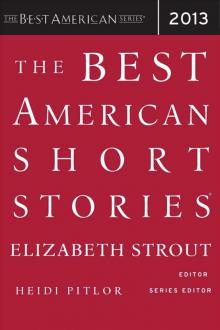 The Best American Short Stories 2013
The Best American Short Stories 2013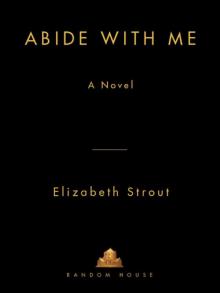 Abide With Me
Abide With Me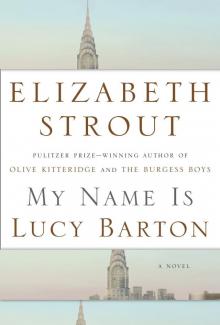 My Name Is Lucy Barton
My Name Is Lucy Barton Olive Kitteridge
Olive Kitteridge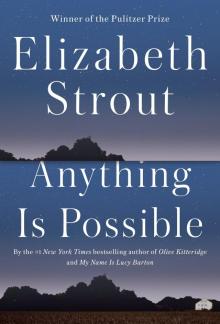 Anything Is Possible
Anything Is Possible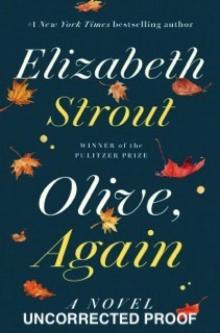 Olive, Again (ARC)
Olive, Again (ARC)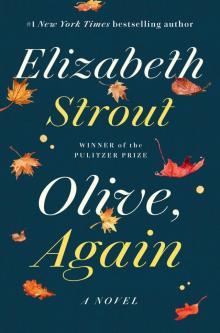 Olive, Again
Olive, Again